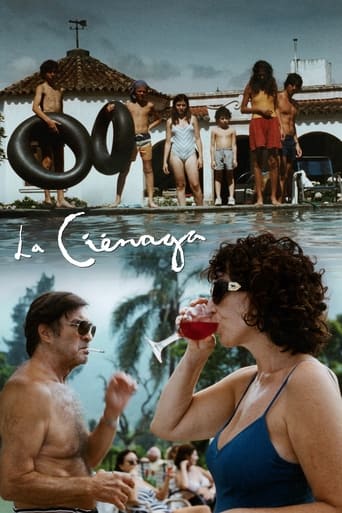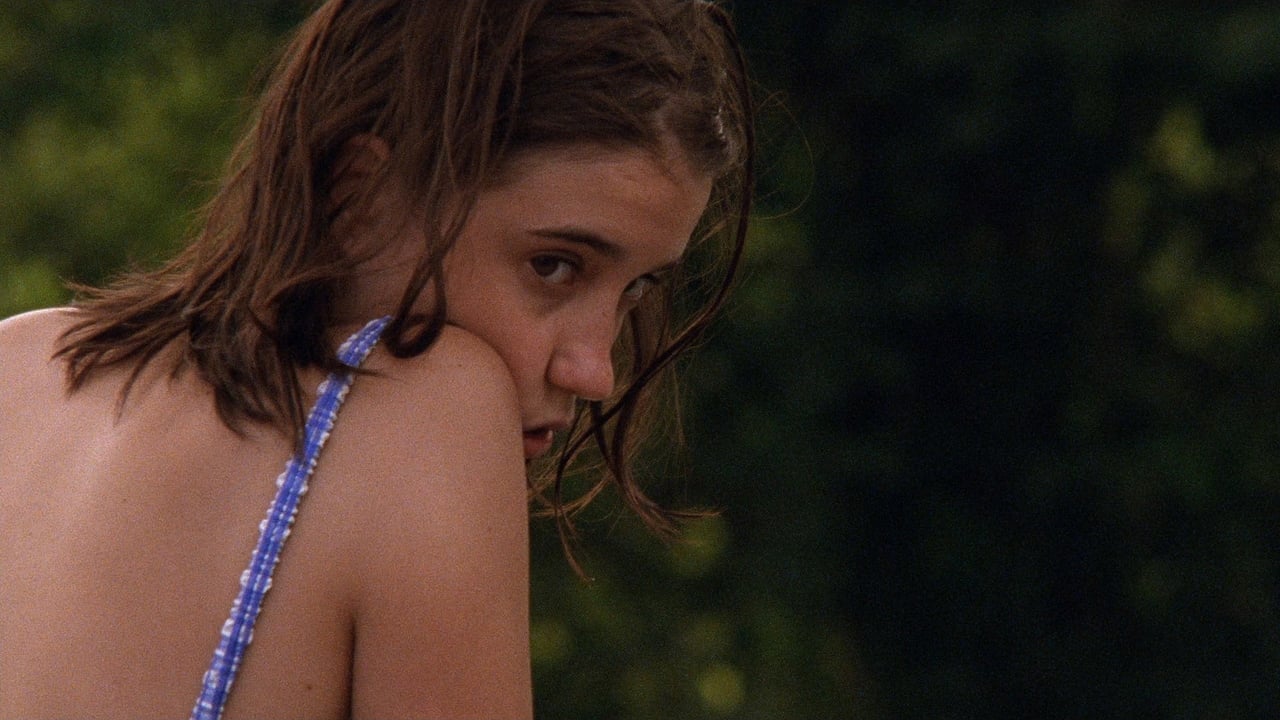lasttimeisaw
Shot in Salta, director Lucrecia Martel's hometown, nestled in the Argentinian high plains, her debut feature THE SWAMP is a cinematic homage to the place and milieu where she grows up, it is intimate, clammy, misty and torpidity-ridden, an internalized sociological drama that definitely puts her name on the cinematic map. Two households' quotidian lives are interlocked together, Mecha (Borges) is the matriarch of a petit bourgeois family, husband Gregorio (Adjemián), two teenage daughters Verónica (Balcarce) and Momi (Bertolotto) and a younger son Joaquín (Baenas) who has lost his right eye and pending for an operation. Most of them vegetate around in their decrepit countryside estate under the influence of the humid and sweltering weather, a sanguineous accident brings back her eldest son José (Bordeu) for a sojourn and the visits from her working-class cousin Tali (Morán), who is living in the town with her husband Rafael (Valenzuela) and a brood of 4 (or 5?) younger kids, a prominent feature sees Martel unfolds the story in medias res and leaves no explanatory pointers, therefore it is completely left to viewers to piece together the make-ups of the two families (and other backstories) through its meandering and characteristically rowdy narrative, a task this reviewer might not able to cinch in the end.Kit her camera with a slithering but sensibly unobtrusive mobility, Martel unwaveringly levels it to her close-knit characters with clinical observation, often from unorthodox angles, no establishing shots, seldom focuses on the exterior locations or utilizes long shots, the camera is restive but the characters are entrapped and enervated inside their pokey space, mostly on their beds, lazing around, doing nothing, their stalemate is contagious, a metaphor blandly illustrated by a buffalo bogged down helplessly inside a swamp. Day-to-day triviality is given a microscopic examination under Martel's perceptive, score-free orchestration, through which she deftly lays out the chasm between classes and races (Mecha vs. her Amerindian servants), latent lesbianism (Momi's obsession with the young maid Isabel, played by a stolid Andrea López), the connubial strain and sheer contempt, religious sideswipe (through faux-newsreel of Virgin Mary's alleged manifestation) and the quasi-incestuous horseplay between José and Véronica, and pertaining to Martel's female slant, it is him in the state of dishabille for viewers to gaze upon, all integrated organically into this understated but telling drama that excoriates Argentina's pandemic ennui, to the point when its detriment start to tell in the accidental (but presaged) tragedy which brings down the final curtain, it hits less like a wake-up call than the designed vagaries of kismet, a very fine stepping stone from a robust film-maker making a good fist of counterpoising the inexplicable with the pedestrian.
Hunky Stud
I usually don't rate any movie below 5 as long as I can still watch them from the beginning to the end. however, this movie is really boring, since I don't know any of the actors, it feels as if I am watching a bad edited reality show.Sure, there are those people who are talking, arguing, etc, but what is the purpose of this movie, I don't understand. It could be that because I have never been to that country, so I don't really know about their culture. Still, I have seen plenty of foreign movies, some are just so emotional. After watching this movie, I didn't feel a thing about this movie, there is nothing memorable about it at all.And I am surprised about this high rating for this movie. Basic Instinct 2 is much better than this one for sure, but it only has about 4.
Galina
For Christine«Yes, they're sharing a drink they call loneliness»
(Billy Joel)A friend who recommended the film La Cienaga, (2001) aka The Swamp, described it as «a film with guts.» His description proved to be accurate and it most certainly took Lucrecia Martel, first time Argentinian director/writer, guts to make it. Based on memories of her family, and shot entirely in Martel's home town, Salta, in northern Argentina, The Swamp is a confident and skillful piece of filmmaking that draws quite a pessimistic picture of decline and degradation of Argentinian upper-middle class. The atmosphere of indifference and apathy oozes from every square inch of the screen, underlining all facets of the empty existence of the characters in the movie.Intense and moody, The Swamp is not an easy film to watch, but like the eponymous swamp, it sucks you in and does not let you forget its anti- heroes-the bored, weak, dirty and detestable adults and their offspring of all ages, all of whom are spending their summer vacation in a crumbling country house which has seen better times.This is not an action film, nor does it have much of a story; however, the Swamp delivers a visceral and direct assault to the senses that transforms the viewer from a distant observer into a reluctant participant in tropical hellish vacation where lives sink into meaningless apathetic drunk stupor to the sound of ice clinking in glasses with red wine and omnipresent image of the dirty and stagnant swimming pool in the background.While undeniably original, as well as personal and intimate, the film brings to mind the themes and the subjects of famous works of art and literature from different cultures. References to A.P. Chekhov's dramas, The Cherry Orchard and Three Sisters, whose main themes are decay of the privileged class and the effect social change has on people, are apparent. Martel may have been also inspired by Macondo, a fictional town described in Gabriel Garcia Marquez's novel, One Hundred Years of Solitude. The similarities in the themes of rise, decline, and inevitable fall of once thriving and successful families are noticeable. But instead of mythical incessant downpour that destroyed the Buendia family home and brought the downfall and disappearance of Macondo from the face of the earth in the Marquez's powerful novel, it is smoldering heat that overpowers everything and everybody in The Swamp. It crawls under the skin, envelops the souls and the minds, and melts away thoughts, desires, and dreams, leaving only decay and hopelessness. The family estate, once a prosperous, imposing, grand building became a run- down house while the owners limply sprawled poolside on their deck chairs, too tired, bored, and inert to care.You would expect the children and teenagers in the movie, with their natural curiosity, budding sexuality, and lust for life to bring a sense of hope and happiness, a breath of fresh air, but sadly, not in The Swamp. Left to their own devices, they wander aimlessly in the labyrinths of loneliness, as they face their own demons of growing up. It would seem that misery and failure, like contagious diseases, pass down from generation to generation and lurk on the surface of the estate's fetid, filthy, ominous swimming pool.
Howard Schumann
La Ciénaga, directed by first-timer Lucrecia Martel, uses a seemingly uneventful series of episodes and an atmospheric sense of impending doom to make a statement about the decadence of the Argentine middle class. The decaying families are portrayed without much sympathy, showing them as racist, uncaring, and self-indulgent.The screen veritably pulsates with life and ugliness. Every frame is filled with children and animals running in and out, dogs barking, everyone talking at the same time, music blaring, and the TV bellowing something about Virgin Mary sightings. It's almost as if the camera is eavesdropping on an intimate family gathering, making the viewer feel like an uninvited guest at a party.The narrative (such as it is) is about two families and their children thrown together at the end of a stifling hot summer, and how everybody bears the marks of carelessness and inattention: scars, burns, bruises. Nothing works in this milieu; the pool is very dirty, one boy has lost one eye, another is afraid of stories about dog-rats, drinking is excessive and accidents result as a consequence. The mother (Mecha) is a drunk who just seems to be waiting for the end to face life in bed for 20 years like her own mother. She makes racist remarks directed toward her servant, yells at her own daughter Momi, (who seems to be infatuated with the servant), and makes vague plans to go to Bolivia to buy school supplies for the kids.La Cienaga is not easy to watch. It is moody, sensual, atmospheric, almost unbearably intimate, with a constant level of anxiety and tension. You can feel the humidity building on your forehead. Danger is always near, and violence seems not just possible but probable. There is an unspoken longing for something, anything good to happen to relieve the emptiness of life. I was reminded of Chekhov and Dostoyevsky. It is almost Bunuelian in its feeling but, unlike Bunuel, it is not dark comedy, just dark.The unspoken backdrop is the recent history of Argentina, an unending nightmare of political violence, social unrest, and fiscal disaster. Only the children give us any hope for the future. It is a compelling picture of class arrogance with an ending as moving as any I've seen. Strongly recommended but bring a lot patience and a de-humidifier.


 AD
AD


